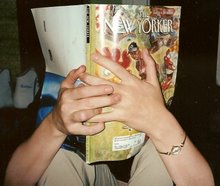Book review: "The Blind Side"
"The Blind Side: Evolution of a Game." By Michael Lewis. W.W. Norton. $24.95. 299 pages.
Call it "Moneyball 2: Between the Hash Marks."
Just in time for the NFL playoffs, best-selling author Michael Lewis returns with a freakonomic look at football’s offensive line, specifically the left tackle position.
"The Blind Side: Evolution of a Game" starts in the middle of a Washington Redskins/New York Giants game — the infamous 1985 Monday Night Football game where Lawrence Taylor sacked Joe Theismann and gruesomely broke his leg, ending Thiesmann’s career. (On the field, anyway; one kind of wishes Taylor would sack Thiesmann in ESPN’s broadcasting booth and end his presence on the current Monday Night Football, but that’s a different column.)
The book goes on to explain how defensive players like Taylor, combined with the growing appeal of the West Coast offense (the short passes popularized by 49ers coach Bill Walsh), created the need for a new prototype of the left tackle position on the offensive line to protect the (normally right-handed) quarterback’s blind side.
Left tackles, on average, are now the second-highest player on NFL teams behind the quarterback, yet no one knows who they are — seriously.
Do you think Peyton Manning would have all that time in the pocket if it weren’t for Tarik Glenn?
Tarik who?
Exactly.
Lewis makes this point in "The Blind Side" by intertwining two threads, one analytical and one personal, as he did in "Moneyball." In that book, Lewis took Oakland Athletics general manager Billy Beane as a case study to examine the growing influence of Bill James’ SABRmetrics on the sport of baseball. In this work, a young high school player from Memphis named Michael Oher (pronounced “Oar”) becomes the foreground of an explantation of how the left tackle position has become essential to the NFL offense.
While Beane became an oddly compelling hero in "Moneyball," Oher becomes much more than that. If your eyes haven’t watered by the end of the book, whatever your gender, then you have no heart. None. (I have male friends who confessed to me that they cried while reading this, so I know.) By the same token, if this book has not made you laugh aloud, then you have absolutely no sense of humor.
Oher was what has, sadly, become the norm in the inner city — a forgotten child with a drug-addicted mother, abandoned by the system that should have protected him. Through a series of events that can only be described as a miraculous, whatever one’s religious inclination, Oher manages to survive. He becomes cared for by another black man who had escaped those same projects and who enrolls Oher at a private, mostly white, Christian school.
There, Oher is recognized as the most promising left tackle talent in the country. A rich, white, conservative Christian family takes him in and adopts him. Despite being recruited by almost every team in the country (literally), Oher follows in his new father’s footsteps to the University of Mississippi, where he remains at this moment, having just finished his sophomore season.
Lewis takes his time revealing Oher’s dismal past, ostensibly aping the slow pace Oher himself has taken opening up to his new parents, Sean and Leigh Anne Tuohy. When the grim details finally spill out all at once in the next to last chapter, it seems like the material for another book. Lewis is a great analyst of the weird way in which sports, statistics and economics intertwine. In "The Blind Side," he proves himself a humanist, too, although one cannot help wondering how much more powerful the story of Michael Oher would have been if told by someone like Adrian Nicole LeBlanc.
Still, for all its flaws, "The Blind Side" makes you root for Oher’s success. Although "Moneyball" was raved about by baseball fanatics when it first came out, as the years have gone by and Billy Beane’s top prospects in the book have yet to prove themselves in the majors, many fans (and commentators) have taken to dismissing the book.
But Kevin Youkilis, one prospect Beane could not lure away from the Red Sox organization, is finally starting to become a star. One can only keep one’s fingers crossed that in a few years, NFL fans are shouting “Oooooooaaaaarrrrrrr!” like Boston fans have started shouting “Yoooooooooooook!”

No comments:
Post a Comment